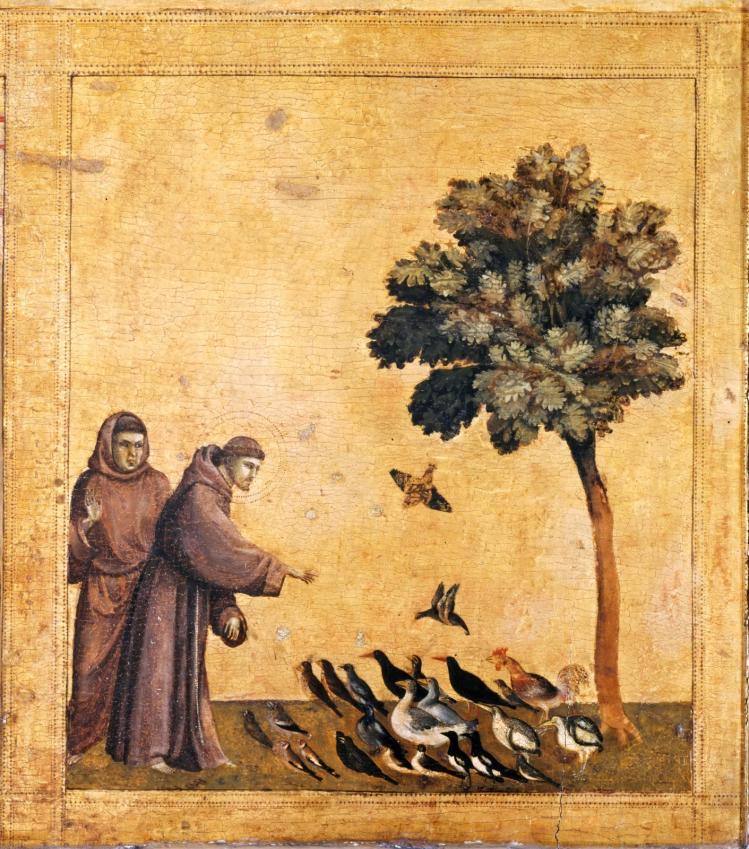
Modern technology seldom comes to mind in connection with Francis of Assisi, yet there is one device that he would have prized. A smartphone with a music app playing one track in an endless loop would have suited his purposes perfectly. Living in the thirteenth century, he encouraged his brothers to sing his favorite song without ceasing. He may have rejoiced, but they longed for a change in the playlist.
The lyrics that Francis insisted on hearing were ones he wrote: “The Canticle of the Sun.” The incomparable hymn to God is regarded as one of the earliest poems in Italian literature. It remains influential today; Pope Francis took it as the inspiration for his encyclical Laudato si’ on the care of the planet.
To Francis of Assisi, the canticle’s words were a prayer. He was caught up in a God who had created such marvels as the sun that brought the day and the fire that illuminated the night. But it is possible that Francis wanted to hear the song endlessly simply because he was so proud of it. Francis may not have put it that way; if he had, this beautiful hymn might have met the same fate as a little vase he once made during Lent. One day while he was at prayer, he glimpsed the vase and admired its beauty. Suddenly, ashamed that his appreciation for what he had made had taken his mind away from the Lord, he threw the tiny object into the fire.
Francis often worked to squash pride in his own accomplishments and to offset others’ admiration for him. When a poor woman asked him for alms, he handed her his cloak. Then, taking note of the crowd of admirers that was following him, he minimized his generosity by insisting, “Doing this makes me proud of myself.” When he was ill, he had to wear a fur pelt under his tunic to keep himself warm, but Francis requested that it be sewn outside his garment to show that he was taking special care of himself and did not deserve credit for self-sacrifice.
But “The Canticle of the Sun” was an exceptional situation. It emerged from a period of anguish and torment. In early 1225, Francis’s sight was failing, he was physically weak, and he was worried about the future of his order. Then he heard that Clare, whom he had persuaded years earlier to become the first woman to join his movement, was at the point of death. He had himself carried to her community at San Damiano a few miles outside Assisi, where he took up residence in a branch hut a few yards outside her window. Light soon became unbearable and animals, which had usually been a comfort, became his torturers. Mice overran his shelter, swarmed his table, and deprived him of peace at the very time he was among his closest friends. One night, as Francis endured his suffering, he heard a voice tell him to be at peace as if he were in heaven.
Enlightenment dispelled his woe. The next morning, the first line of his hymn of praise—“Most high, all-powerful, good Lord God”—came to him and he worked out the rest as his faithful secretary Brother Leo took down his words. Francis praised what had given him joy and never disappointed him: the sun, the moon, and the stars that had lit his way by night, and the earth that had sustained him—all the creation of God the Father. When a conflict arose between the mayor of Assisi and its bishop, Francis added a verse and had his expanded version sung to the adversaries. They wept, hugged, and promptly reconciled.
Francis had his companions sing his canticle with him over and over as he grew more enamored of it, and his friends more weary. As the days passed, the humble friar developed the single-mindedness of a proud artist determined that the world see his work, albeit in the service of God. Displaying a love of performance that had made him the master of revels in his youth, he devised a plan to spread “The Canticle of the Sun.” He would send Brother Pacifico, who had once been a great troubadour, into the world with one of the finest preachers from among the Lesser Brothers. Pacifico would sing it, the other brother would give a homily, and finally the two men would invite everyone to join in Francis’s song. Then they would exhort the crowd: “We are the jongleurs of God, and the only reward we want is to see you lead a truly penitent life.”
Francis traveled to Rieti to have his eyes treated, and Pacifico joined Francis there. The former bard had renounced the worldly joy of his music and its lusty connotations to follow Francis. But now Francis was asking him to take up his instrument again. Surely Pacifico still longed for it as a thirsty man longs for drink, but he was afraid to indulge his great temptation. He tried to talk his way out of Francis’s request. Francis acknowledged that zithers were used to promote vanity and desire, but he countered that this was an opportunity to turn them to the glory of God and the comfort of souls. Francis told him to obtain one from some respectable man so they could set “The Canticle of the Sun” to a worthy melody.
Pacifico protested that the people of Rieti knew of his past, and he was afraid that they would be shocked and disappointed to hear that he was returning to his old calling. Francis, a former merchant who would not have considered selling cloth to raise funds for the poor, finally accepted Pacifico’s refusal.
The next night around midnight, as Francis lay sleepless, he heard a melody more exquisite than any he had heard before. Someone nearby was playing the zither. Francis listened, enthralled until the music faded as quickly as it had begun. At daybreak, Francis told Pacifico with some reproach, “When I asked you, you refused my request, but the Lord who comforts his friends when they are suffering consoled me.” He declared that the Lord himself had played the zither for him, since Pacifico would not. Francis’s followers in Rieti considered it a great miracle. But who knows? Perhaps Pacifico took up the zither again in the dead of night unseen by any but God.
Every day in the year or so that remained to Francis on earth, he sang or heard his canticle as an antidote to his own suffering, and he asked everyone around him to fill the air with it. When he lay dying, he called for it to be sung to enliven the somber mood of the vigil outside the bishop’s palace. One brother counseled Francis to be more serious in the face of death, but Francis disagreed, insisting that he wanted everyone to have the pleasure of the song.
Finally, he composed new concluding verses:
Praised be my Lord for Sister Death, from which no man escapes.
Woe to him who dies in mortal sin.
Blessed are those who die in Thy most holy will,
for the second death shall have no power to do them harm.
Praise ye and bless the Lord,
and give thanks to Him and serve Him with great humility.
Francis told his loving companions that he did not want to see them weeping. Instead, he wanted them to sing his canticle. And so they did, as his soul made its way to heaven and his song into the world.
Please email comments to [email protected] and join the conversation on our Facebook page.
Share
Previous Story
Thirty Days in Jerusalem
Next Story
An Awakening Universe

